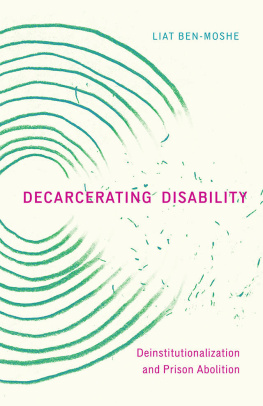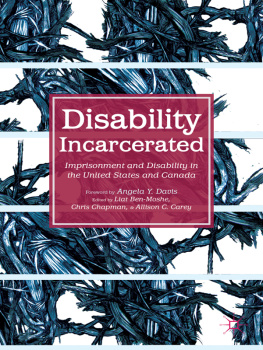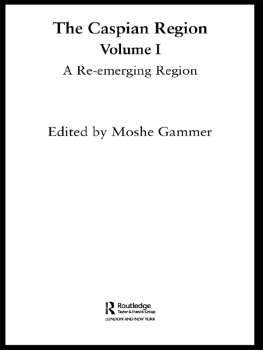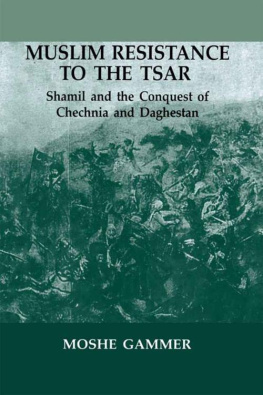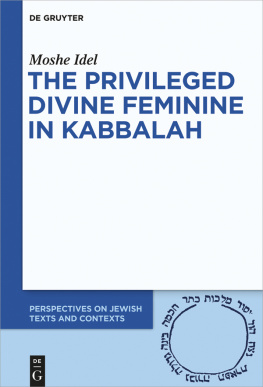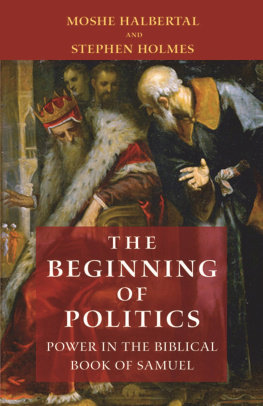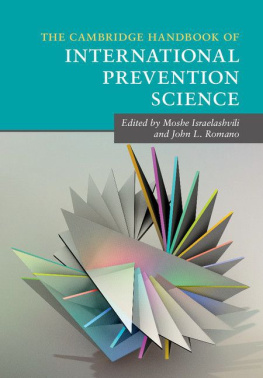Liat Ben-Moshe - Decarcerating Disability
Here you can read online Liat Ben-Moshe - Decarcerating Disability full text of the book (entire story) in english for free. Download pdf and epub, get meaning, cover and reviews about this ebook. year: 2020, publisher: University of Minnesota Press, genre: Politics. Description of the work, (preface) as well as reviews are available. Best literature library LitArk.com created for fans of good reading and offers a wide selection of genres:
Romance novel
Science fiction
Adventure
Detective
Science
History
Home and family
Prose
Art
Politics
Computer
Non-fiction
Religion
Business
Children
Humor
Choose a favorite category and find really read worthwhile books. Enjoy immersion in the world of imagination, feel the emotions of the characters or learn something new for yourself, make an fascinating discovery.
- Book:Decarcerating Disability
- Author:
- Publisher:University of Minnesota Press
- Genre:
- Year:2020
- Rating:3 / 5
- Favourites:Add to favourites
- Your mark:
- 60
- 1
- 2
- 3
- 4
- 5
Decarcerating Disability: summary, description and annotation
We offer to read an annotation, description, summary or preface (depends on what the author of the book "Decarcerating Disability" wrote himself). If you haven't found the necessary information about the book — write in the comments, we will try to find it.
Decarcerating Disability — read online for free the complete book (whole text) full work
Below is the text of the book, divided by pages. System saving the place of the last page read, allows you to conveniently read the book "Decarcerating Disability" online for free, without having to search again every time where you left off. Put a bookmark, and you can go to the page where you finished reading at any time.
Font size:
Interval:
Bookmark:
Liat Ben-Moshe

University of Minnesota Press
Minneapolis London
Cover description: The cover showcases a circular design on a faded yellow background. Layers of green concentric circles spiral from the center of the page and are cut off on the left side. Each circle, or circular pattern, is bigger and embedded in the next, and the whole resembles a target or growth rings on a tree. The circular pattern looks like it was drawn by hand in colored pencil. On the right side of the image are shavings or fragments that make it look like the circular pattern is being erased or shattered or disrupted by the title, as if the title is breaking through or encroaching on the circles. The title Decarcerating Disability is in magenta color. At the top right corner is the authors name, Liat Ben-Moshe, in green, and at the right bottom corner is the subtitle Deinstitutionalization and Prison Abolition in magenta color.
Leroy Moore Jr., CAGED, Goddamn Philadelphia, SoundCloud, March 27, 2013, https://soundcloud.com/blackkrip/caged-goddamn-philadelphia, printed by permission of Leroy F. Moore Jr.
Chapter 3 was published in a different form as Dis-epistemologies of Abolition, Critical Criminology 26, no. 3 (2018): 34155; reprinted with permission from Springer Nature, copyright 2018. Portions of chapter 4 were published in Why Prisons Are Not the New Asylums, Punishment and Society 19, no. 3 (2017): 27289.
Copyright 2020 by the Regents of the University of Minnesota
All rights reserved. No part of this publication may be reproduced, stored in a retrieval system, or transmitted, in any form or by any means, electronic, mechanical, photocopying, recording, or otherwise, without the prior written permission of the publisher.
Published by the University of Minnesota Press
111 Third Avenue South, Suite 290
Minneapolis, MN 55401-2520
http://www.upress.umn.edu
The University of Minnesota is an equal-opportunity educator and employer.
Library of Congress Cataloging-in-Publication Data
Names: Ben-Moshe, Liat, author.
Title: Decarcerating disability : deinstitutionalization and prison abolition / Liat Ben-Moshe.
Identifiers: LCCN 2019027128 (ebook) | ISBN 978-1-4529-6350-1 (ebook)
Subjects: LCSH: DeinstitutionalizationUnited States. | People with disabilitiesInstitutional care. | Prisoners with disabilitiesDeinstitutionalizationUnited States. | Alternatives to imprisonmentUnited States.
Classification: LCC HV1553 (ebook) | DDC 365/.6470870973dc23
LC ebook record available at https://lccn.loc.gov/2019027128
Ive lived my life within one degree of separation from what Harriet McBride Johnson called the disability gulag, the various sites in which people with disabilities are made to disappear. Over the years I have been to carceral spaces (prisons, psych facilities, institutions for people with intellectual and developmental disability labels) as a visitor, professional, and teacher, but was never captured therein. Still, the resemblance between these carceral places seemed striking. Even more striking to me were the movements and activism that refute the rationale for carceralitythe need for psychiatric hospitals, residential institutions for people with disabilities, and prisons.
The need to write about the connections between deinstitutionalization, disability/antipsychiatry, and prison abolition came from two pivotal encounters. The first and most influential figure to cast his enormous shadow over this project was Dr. Steven J. Taylor, who passed away in November 2014 but whose spirit and knowledge reverberate in many chapters of this book. At his memorial, I shared the following story. The first time I ever met him was during my first week in the United States, in August 2002, as a new Ph.D. student coming to study sociology and disability studies at Syracuse University. Imagine my surprise (and later delight) to meet for the first time my new American advisor, whom a few minutes prior I thought was a housing-insecure person wandering into the building for shelter, with flip-flops and raggedy clothing, and sporting a long, mostly unkempt beard. It is most telling that this humble man worked all his life to make sure that people, whatever their disabilities or labels, all had homes, real homes. Most of what I know about deinstitutionalization, as spirit, praxis, ethical stance, and process, came from him. He was not only an advisor but very much an informant for this project.
Steve was most well known for his tireless activism and scholarship advocating the closure of institutions for people with intellectual and developmental disabilities and supporting meaningful participation and life in the community. As part of that work, in which he was involved from the 1970s until his passing, he created spaces, developed courses, and provided academic support toward the development of what we now call disability studies. His work was especially influential in bringing attention to developmental disabilities within disability studies. He exemplified not only what can be done under the rubric of disability studies but that one can be an academic and still maintain some semblance of integrity and ethics. The guiding question for all projects, grants, and writings was: Is this going to aid in liberating people?a core question at the heart of abolition praxis and one that guides me to this day.
This question led me to the second encounter that birthed this book. In 2008, I had the pleasure of meeting Dr. Angela Y. Davis when she was visiting Syracuse University. I came to her office hours wide-eyed, trying to make connections with and between movements, prodding for any leads. After a few meetings, I asked, Do you know anyone who is connecting disability to prison abolition in critical ways? I would like to read or meet them. She said, without flinching, Yes, I do. You are. Her words stayed with me for two reasons. First, it was validating to hear that what I was embarking on was needed and that I (at that point an ABD student) was becoming an expert on the topic. Her words also made clear the paucity of written work (and, at that time, activist work) that connected deinstitutionalization as a form of decarceration and prison abolition. Second, it modeled for me the kind of generosity and reciprocity that was so moving coming from such a luminary, and one I try to model for my students today. It underscored how, as scholar-activists entrenched in radical political projects, we learn and build from and with each other.
Font size:
Interval:
Bookmark:
Similar books «Decarcerating Disability»
Look at similar books to Decarcerating Disability. We have selected literature similar in name and meaning in the hope of providing readers with more options to find new, interesting, not yet read works.
Discussion, reviews of the book Decarcerating Disability and just readers' own opinions. Leave your comments, write what you think about the work, its meaning or the main characters. Specify what exactly you liked and what you didn't like, and why you think so.

